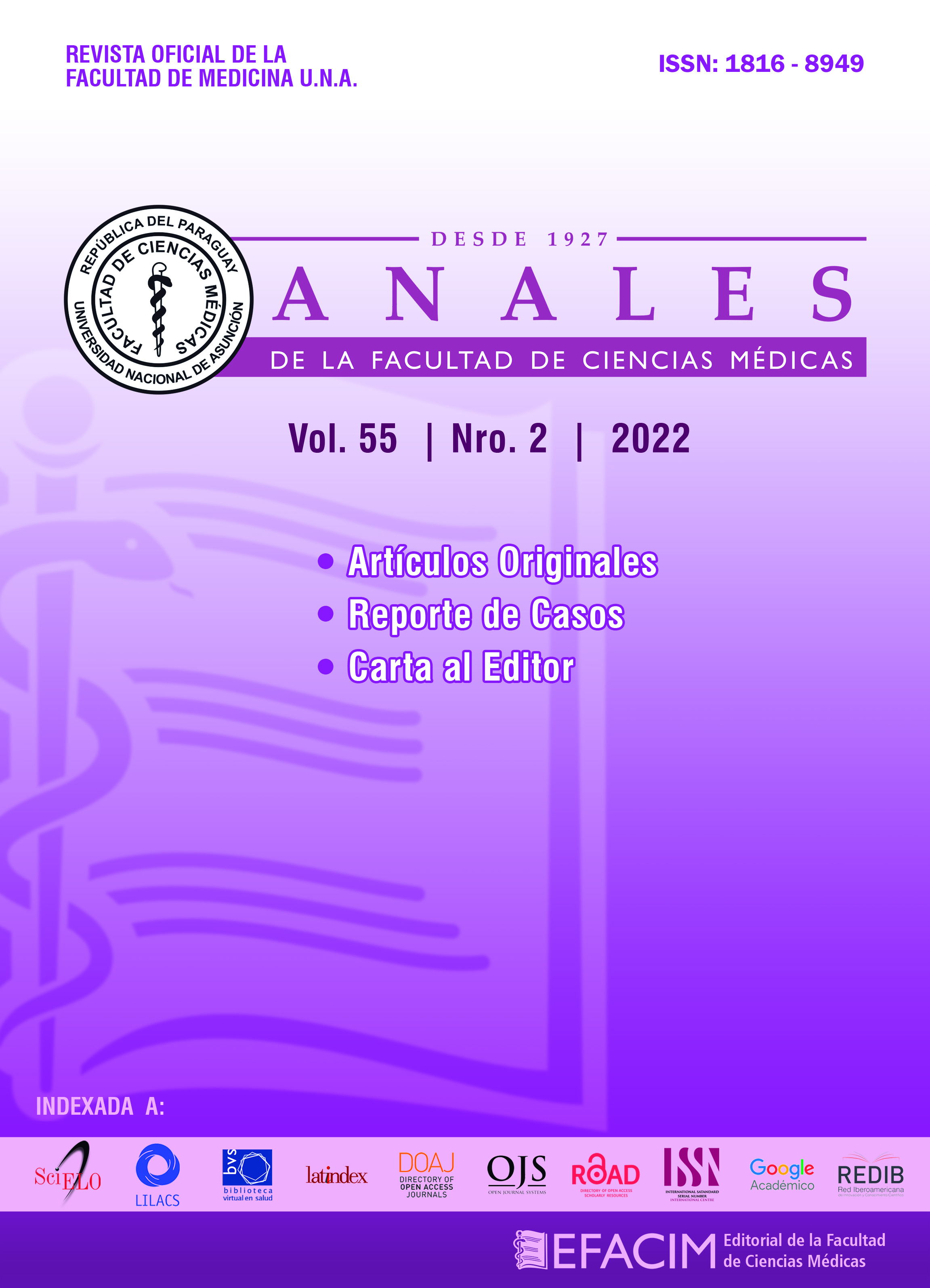Resección vascular mayor por adenocarcinoma pancreático ductal: reporte del primer caso registrado en Paraguay
Palabras clave:
Adenocarcinoma ductal pancreático, Cáncer pancreático borderline resecable, Duodenopancreatectomía, Resección de vena porta, quimioterapia neoadyuvanteResumen
El adenocarcinoma pancreático ductal (APD) es la cuarta causa de muerte por cáncer y se proyecta que para el 2030 ocupe el segundo lugar. El pronóstico es sombrío, siendo la sobrevida menor a 9% en 5 años. Se consideró durante mucho tiempo a la resección quirúrgica como el único tratamiento curativo, sin embargo, sólo el 15 a 20% de los pacientes pueden ser beneficiados con la misma. La clasificación pre terapéutica más utilizada es la del National Comprehensive Cáncer Network (NCCN), basada en la relación del tumor con estructuras vasculares, clasificándolos en tumores “resecables”, de resección límite “Borderlines” y “localmente avanzados”. Se presenta el primer caso registrado en Paraguay de APD con infiltración de la Vena Mesentérica Superior (VMS) tratado con duodenopancreatectomía cefálica (DPC) asociada a resección vascular mayor.
Referencias
Rahib L, Smith BD, Aizenberg R, Rosenzweig AB, Fleshman JM, Matrisian LM. Proyectar la incidencia y las muertes por cáncer hasta 2030: la carga inesperada de los cáns de tiroides, hígado y páncreas en los Estados Unidos. Cancer Res (2014) 74 (11): 2913-2921.
Carpelan-Holmström M, Nordling S, Pukkala E, Sankila R, Lüttges J, Klöppel G, Haglund C. ¿Alguien sobrevive al adenocarcinoma ductal pancreático? Un estudio a nivel nacional que reevalúa los datos del Registro Finlandés del Cáncer. Tripa. 2005 Marzo;54(3):385-7. doi: 10.1136/gut.2004.047191. PMID: 15710987; PMCID: PMC1774412.
Ryan DP, Hong TS, Bardeesy N. Pancreatic adenocarcinoma. N Engl J Med. 2014 Sep 11;371(11):1039-49. doi: 10.1056/NEJMra1404198. PMID: 25207767.
Gobbi PG, et al. The prognostic role of time to diagnosis and presenting symptoms in patients with pancreatic cáncer. Cancer Epidemiology, 2013; 37: 186-90.
Sanjeevi S, et al. Impact of delay between imaging and treatment in patients with potentially curable pancreatic cancer. Br J Surg 2016; 103: 267-75.
Khorana AA, et al. Potentially Curable Pancreatic Cancer: American Society of Clinical Oncology Clinical Practice Guideline Update. J Clin Oncol. 2017; 35: 2324-2328.
Al Hawary MM, et al. Pancreatic ductal adenocarcinoma radiology reporting template: consensus statement of the society of abdominal radiology and the American pancreatic association. Gastroenterology. 2014; 146: 291-304.
Poruk KE, et al. The clinical utility of CA 19-9 in pancreatic adenocarcinoma: diagnostic and prognostic updates. Curr Mol Med 2013; 13: 340-51.
Gerritsen A, et al. Preoperative characteristics of patients with presumed pancreatic cancer but ultimately benign disease: a multicenter series of 344 pancreatoduodenectomies. Ann Surg Oncol. 2014; 21: 3999-4006.
Tempero MA, Malafa MP, Chiorean EG, Czito B, Scaife C, Narang AK, Fountzilas C, Wolpin BM, Al-Hawary M, Asbun H, Behrman SW, Benson AB, Binder E, Cardin DB, Cha C, Chung V, Dillhoff M, Dotan E, Ferrone CR, Fisher G, Hardacre J, Hawkins WG, Ko AH, LoConte N, Lowy AM, Moravek C, Nakakura EK, O'Reilly EM, Obando J, Reddy S, Thayer S, Wolff RA, Burns JL, Zuccarino-Catania G. Pancreatic Adenocarcinoma, Version 1.2019. J Natl Compr Canc Netw. 2019 Mar 1;17(3):202-210. doi: 10.6004/jnccn.2019.0014. PMID: 30865919.
Scheufele F, et al. Preoperative biliary stenting versus operation first in jaundiced patients due to malignant lesions in the pancreatic head: A meta-analysis of current literature Surgery. 2017; 161: 939-950
Neoptolemos JP, et al. Comparison of adjuvant gemcitabine and capecitabine with gemcitabine monotherapy in patients with resected pancreatic cancer (ESPAC-4): a multicentre, open-label, randomised, phase 3 trial. Lancet. 2017; 389: 1011-1024.
Delpero JR, et al. Prognostic Value of Resection Margin Involvement After Pancreaticoduodenectomy for Ductal Adenocarcinoma: Updates From a French Prospective Multicenter Study.Ann Surg. 2017; 266: 787-796.
Versteijne E, et al. Meta-analysis comparing upfront surgery with neoadjuvant treatment in patients with resectable or borderline resectable pancreatic cancer. Br J Surg. 2018; 105: 946-958.
Jang JY, et al. Oncological Benefits of Neoadjuvant Chemoradiation With Gemcitabine Versus Upfront Surgery in Patients With Borderline Resectable Pancreatic Cancer: A Prospective, Randomized, Open-label, Multicenter Phase 2/3 Trial. Ann Surg. 2018; 268: 215-222.
Suker M, Beumer BR, Sadot E, et al. FOLFIRINOX for locally advanced pancreatic cancer: a systematic review and patient-level meta-analysis. Lancet Oncol. 2016; 17: 801-810.
Pietrasz D, Turrini O, Vendrely V, Simon JM, Hentic O, Coriat R, Portales F, Le Roy B, Taieb J, Regenet N, Goere D, Artru P, Vaillant JC, Huguet F, Laurent C, Sauvanet A, Delpero JR, Bachet JB, Sa Cunha A. How Does Chemoradiotherapy Following Induction FOLFIRINOX Improve the Results in Resected Borderline or Locally Advanced Pancreatic Adenocarcinoma? An AGEO-FRENCH Multicentric Cohort. Ann Surg Oncol. 2019 Jan;26(1):109-117. doi: 10.1245/s10434-018-6931-6. PMID: 30362063.
Bockhorn M, Uzunoglu FG, Adham M, Imrie C, Milicevic M, Sandberg AA, Asbun HJ, Bassi C, Büchler M, Charnley RM, Conlon K, Cruz LF, Dervenis C, Fingerhutt A, Friess H, Gouma DJ, Hartwig W, Lillemoe KD, Montorsi M, Neoptolemos JP, Shrikhande SV, Takaori K, Traverso W, Vashist YK, Vollmer C, Yeo CJ, Izbicki JR. International Study Group of Pancreatic Surgery. Borderline resectable pancreatic cancer: a consensus statement by the International Study Group of Pancreatic Surgery (ISGPS). Surgery. 2014 Jun;155(6):977-88. doi: 10.1016/j.surg.2014.02.001. PMID: 24856119.





